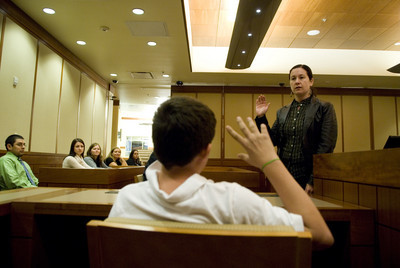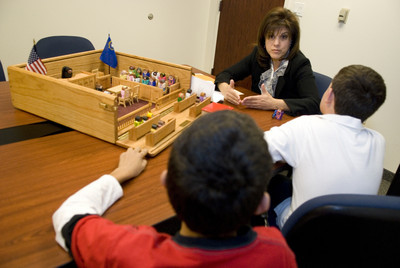Kids have their day in court
Two boys, ages 12 and 13, sit side by side at a conference table as professor Rebecca Nathanson begins their first session of Kids' Court School.
Both boys are scheduled to testify in unrelated cases the following week, and Nathanson wants to know if they're worried.
"No," replies the older boy, who has been to court before.
"Kinda," confesses the other.
Nathanson, a professor of education and law, started the program at UNLV's Boyd Law School in 2003 to educate child witnesses about the investigative and judicial processes. Years of research told her that giving young witnesses more knowledge about the justice system could reduce their anxiety and enhance their testimony.
"That's really been my mission: to enable children to tell their story in court," Nathanson said during a recent interview in her law school office.
To date, 283 children have taken part in the free program, which is receiving praise from lawyers and parents. The school is geared toward children ages 4 through 17, but Nathanson said she has accepted witnesses as young as 3.
Nathanson said lawyers in the juvenile division of the Clark County district attorney's office initially referred most of the participants, and most of those children were victims of sexual abuse; but word of mouth also has brought in other types of witnesses, including young defendants.
"We're not on anybody's side, if you will," she said.
Kids' Court School consists of two one-hour sessions. The first takes place in a conference room with a model courtroom, complete with wooden figurines of a judge, bailiff, attorneys, jurors and spectators.
Students are told a story about a boy whose bicycle has disappeared and a man who is accused of stealing it. The fictional case is used to explain a variety of legal terms.
The second session typically takes place a week later, when students are taught techniques to reduce their anxiety while testifying.
The session ends with a mock trial in the law school's Thomas & Mack Moot Courtroom.
"We never talk about the facts of the actual cases," Nathanson said.
In the moot courtroom, the students take turns on the witness stand and in the judge's seat, where they can wear a black robe and wield a gavel. Graduate and law students usually fill the other courtroom roles.
On a recent afternoon, Nathanson conducted back-to-back sessions for the two boys who were scheduled to testify the following week.
Attorney Katy Hoying, who represents the 12-year-old boy, said she signed up her client after a colleague gave her a brochure about Kids' Court School.
Hoying recently moved from Chicago to begin working for the Children's Attorney Project of the nonprofit Legal Aid Center of Southern Nevada, formerly known as the Clark County Legal Services Program. The attorney project provides direct representation to children in foster care.
When Hoying first saw the model courtroom used at Kids' Court School, she worried that her client would find the program too juvenile.
Her concerns were alleviated after seeing Nathanson in action. Hoying said the program's founder "has a real gift for children."
Hoying said she now counts herself among the school's fans and plans to enroll all her clients in the program.
"I personally felt that it really allowed the kids to address some of their hidden fears in terms of testifying," she said.
Hoying was especially impressed by Nathanson's performance as a defense attorney cross-examining the young witnesses during the mock trial.
"The cross-examination is a big part of the case where I think a lot of the anxiety that the children have comes from," Hoying said.
During the mock trial, a graduate student posed as the man accused of stealing the bicycle. Each boy, when given the chance to play the part of judge, declared the defendant innocent.
Although her client's real case settled out of court, eliminating the need for his testimony, Hoying said Kids' Court School succeeded in giving him more confidence and reducing his stress.
Nevertheless, the boy came to the first session with his own idea about how to calm his nerves while testifying in front of others.
"I'm going to picture them all in their underwear," he told Nathanson.
"That's a good strategy," she said.
Nathanson then shared two other strategies: deep breathing and positive self-talk.
She told the boys to breathe in through their noses and out through their mouths.
"We pretend like we're smelling the roses and blowing out candles," she said.
Nathanson also instructed them to make comments to themselves, such as, "This is a really hard question, but I'm smart and I can do it."
Or, the 12-year-old boy suggested, "This is a really stupid question and let's just get it over with."
"Perfect," Nathanson told him.
Nathanson's work has its roots in the McMartin preschool case of the 1980s, which led to one of the longest and costliest trials in U.S. history. The high-profile case, which involved allegations of sexual abuse at the Southern California preschool, resulted in no convictions.
Nathanson said the case highlighted a perception that children were not reliable witnesses, and it inspired a wave of research, mostly by psychologists, into how to elicit complete and accurate testimony from children.
Among those researchers was Nathanson, who previously had received a bachelor's degree in psychology and a master's degree in special education. She was completing her doctorate in special education at the University of California, Santa Barbara, in 1990, when she accepted a job as a research fellow with Karen Saywitz at the University of California, Los Angeles medical school.
The job lasted three years.
Nathanson said she and Saywitz, a psychologist and professor of psychiatry at UCLA, began looking at strategies to improve children's testimony. They focused their research on enhancing the memory of child witnesses and reducing their suggestibility.
"We also knew that children had little to no knowledge about the judicial process," Nathanson said.
With that in mind, she and Saywitz wrote the curriculum that later would form the foundation of the Kids' Court School at the University of Nevada, Las Vegas.
Nathanson came to UNLV in 2000 as a special education professor. Although not a lawyer, she joined the law school faculty in 2003. She currently holds a joint appointment in the Department of Educational Psychology and the law school.
Nathanson said she is one of only a few researchers who uses actual child witnesses in her studies.
She recently completed a study of about 100 children, using a court-related stress scale she had developed with Saywitz.
Nathanson said the study measured the court-related anxiety the children felt before and after going through Kids' Court School. She said the data showed that the school "significantly reduces the anxiety associated with going to court."
"That is just so exciting to me," she said.
Nathanson said she next wants to study how judges and lawyers rate the credibility of the children who have gone through the program.
She speculates that anxiety interferes with witnesses' ability to retrieve information from their memories.
Her research has shown that the anxiety of child witnesses is caused by a variety of factors, including their fear of not being believed and their fear of answering questions in front of the person who hurt them.
Nathanson said she often is asked why child witnesses change their stories, a characteristic that hurts their credibility.
"Oftentimes, they change their answer because they think they're giving the wrong answer," she explains.
In Kids' Court School, child witnesses are taught that it's OK to give responses like, "I don't know" and "I don't remember," as long as those statements are true.
The children also are taught to recognize suggestive questions "to reduce their acquiescence to these questions," Nathanson said, and to ask for clarification when they don't understand a question.
Graduate assistant Leslie Strasser Murdock, 32, took over as coordinator of Kids' Court School about two years ago and now handles most of its operations.
The former elementary schoolteacher is working toward both a law degree and a doctorate in educational psychology.
Kim Lewis-McClellan said she signed her 8-year-old son up for the program after picking up a Kids' Court School brochure at the Legal Aid Center.
"I just think it's a great program, and it's important to let more people know about it," she said.
Lewis-McClellan said her son went through both sessions in July, shortly before he was scheduled to testify against his father in a child abuse and neglect case.
She said the boy's "whole thought of court was that his dad would get in trouble, get mad and try to get back at him."
Lewis-McClellan said she and another mother watched together as their sons went through the first Kids' Court School session, conducted by Strasser Murdock, and she noticed that both boys experienced a change in their attitudes.
"I think it alleviates a lot of fear, because the kids are able to experience the court process before actually being in court," she said.
Nathanson said parents often fear that testifying about a traumatic event will retraumatize their children, but literature shows that child victims who tell their stories in court, regardless of the outcome, feel empowered and have a better rate of healing.
Teresa Lowry, assistant district attorney over the family support and juvenile divisions, has been a proponent of the Kids' Court School since it began.
When Lowry was chief of the juvenile division, she started a policy of referring all child witnesses under the age of 13 to the program.
"It's a nice way to take that edge off the unknown for both kids and parents," she said.
Nathanson said research shows that children have good memories and can provide reliable testimony.
"I certainly believe that if you educate a child and decrease their anxiety, and if the questions are posed in a developmentally appropriate, nonleading manner, then children definitely have the potential to be credible witnesses."
Contact reporter Carri Geer Thevenot at cgeer@reviewjournal.com or 702-380-8135.


























